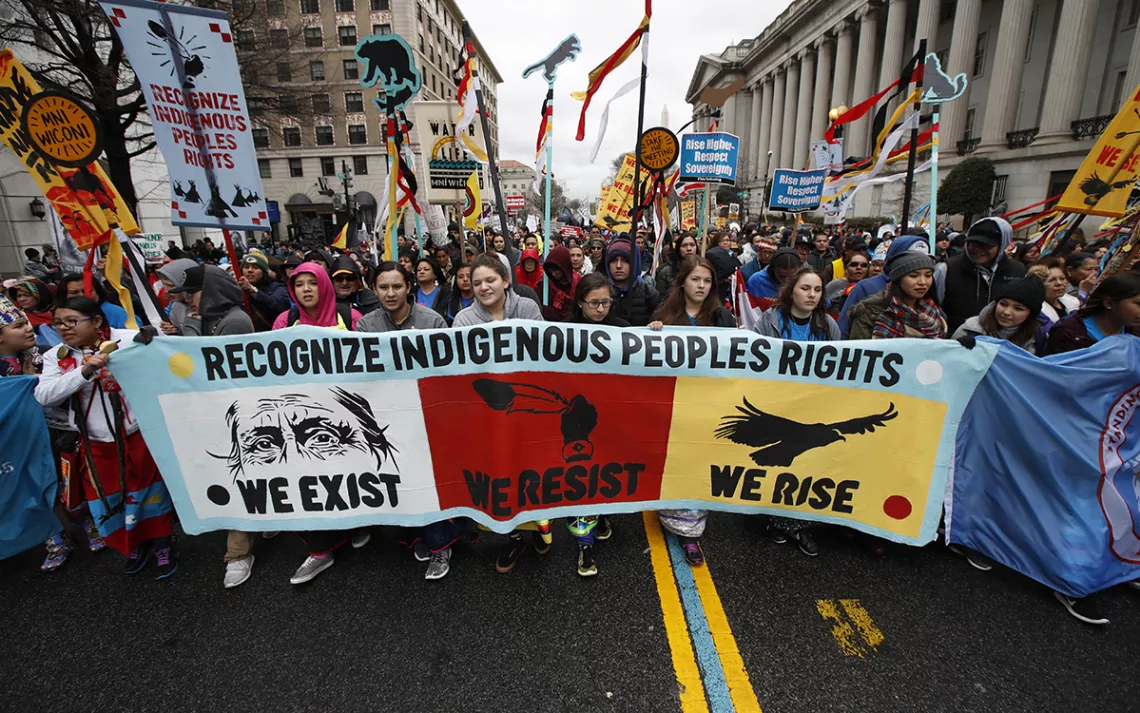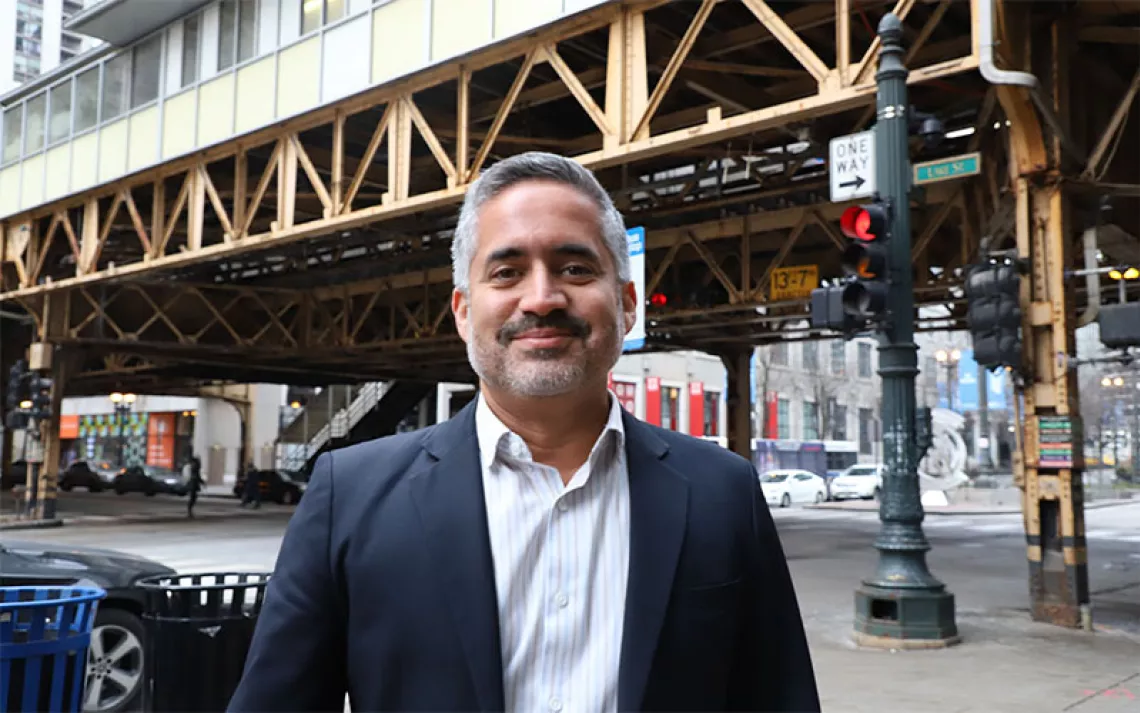States Crack Down on Environmental Activists
New laws target infrastructure protesters, raising free-speech concerns

Native Americans and their supporters march toward the White House in Washington, DC, in March 2017. | Photo by Manuel Balce Ceneta/AP Images
On May 7, Texas state legislators approved legislation that imposes harsh criminal penalties for protest around critical infrastructure projects. Under the rule, actual damage or intent to damage critical infrastructure now includes peaceful process, so long as the protest interrupts operations.
This legislation is among a raft of new and pending legislation that, environmental and civil liberties groups say, are designed to discourage people from opposing controversial infrastructure projects. In Oklahoma, individuals who protest pipelines can now be smacked with a $100,000 fine and 10 years in prison. In Louisiana, activists who make “unauthorized entry of a critical infrastructure” such as oil pipelines face a punishment of up to five years' imprisonment and a $1,000 fine. And legislators in North Dakota last March passed a law under which interfering with pipeline construction becomes a felony punishable by up to five years in prison and a $10,000 fine; groups “conspiring” with such protest could be criminally liable for 10 times that fine.
Thirty-five states have considered or enacted legislation restricting the right to protest. At least eight of those bills were introduced this year, with 12 laws now on the books in Iowa, Louisiana, and Oklahoma. Illinois, Indiana, Idaho, and Texas have pending legislation that would make protest near “crucial infrastructure” punishable by fines and prison time. (A full accounting of such laws can be found at Protest Law Tracker.)
While the severity of the new protest penalties ranges on a spectrum, one common thread in many is punishment for interference in fossil fuel infrastructure. Two particularly far-reaching rules signed into law in Oklahoma and South Dakota earlier this year make it illegal to engage in what’s called “riot boosting”—an amorphous term that includes not only protesters themselves but also anyone who “directs, advises, encourages, or solicits other persons participating,” in the words of the Oklahoma law. Groups or individuals found to be breaking the law would be liable for three times the cost of any damages incurred to corporate or government property. In 2017, South Dakota leaders established a law that curtailed protests on public lands and restricted protests that obstruct traffic. In March 2019, state legislators went further, expanding punitive measures for “riot boosting.” Under the new law, organizations or persons not directly involved in a protest but found to act “through any employee, agent, or subsidiary” can also be held liable. Proposed bills in North Carolina, North Dakota, Florida, Texas, and Tennessee would make it legal to hit protestors with a car, as long as the driver didn’t do so intentionally.
The new anti-protest bills have raised alarm among free-speech advocates, who worry that such broad designations criminalize the First Amendment–protected campaigning or fundraising of peaceful protesters, advocacy groups, and environmental nonprofits. In South Dakota, the ACLU, Sierra Club, and other organizations have filed suit against the anti-protest measures. “These energy companies are working with friendly state government to try to chill free-speech activity, and to try to shift the cost of over-policing from the state and themselves to peaceful protesters,” says Courtney Bowie, legal director for the ACLU South Dakota.
Officials in South Dakota seem to be arguing that there are limits to free speech when protest comes into conflict with economic interests. In a press release, South Dakota governor Kristi Noem said, “I fully support the freedoms of speech and assembly, but we must also have clear expectations and the rule of law. My pipeline bills make clear that we will not let rioters control our economic development. These bills support constitutional rights while also protecting our people, our counties, our environment, and our state.” The governor added, “I believe this approach could serve as the next generation model of major energy infrastructure development." The governor’s office did not respond to requests for comment from Sierra.
The recent surge in legislation appears to be a response to the increase in energy-infrastructure-related protests as the grassroots Keep It in the Ground movement has gained momentum. In late 2016, Indigenous and environmental activists briefly derailed the Dakota Access Pipeline (DAPL) during a five-month standoff with law enforcement and, in the process, inspired new opposition to oil and gas projects nationwide. But the counterattack against environmental advocates has been forceful. In the wake of Standing Rock, Energy Transfer Partners, the company behind DAPL, sued Greenpeace USA for $1 billion for an alleged coordinated criminal conspiracy to undermine the pipeline. A federal court dismissed the lawsuit in February. Just over a week later, ETP brought a second lawsuit against Greenpeace in North Dakota state court. In a press release following the initial ruling, Tom Wetterer, general counsel for Greenpeace USA, responded, “Today’s decision to dismiss Energy Transfer’s baseless lawsuit against Greenpeace and others sends a clear message to companies trying to muzzle civil society that corporate overreach will not be tolerated. It is also a check on corporate efforts to silence dissent.”
The ACLU’s Bowie says that the South Dakota “riot boosting” legislation is a clear response to Standing Rock. But she emphasizes that the law threatens to impact anyone wanting to organize or participate in political protest, regardless of the issue they are concerned about or their political leanings. “I think everyone has something to lose,” Bowie says. “Because right now the way the governor rolled this out is aimed at pipeline protestors, but the law is neutral in terms of who is targeted. . . . I think this is a long-term civil liberties and civil rights issue. The folks that are protesting these pipelines, whether you agree with them or not, they have a right to air their grievances, to raise these issues. I don’t think they see it as something that’s optional.”
The recent anti-protest legislation can be traced back, in large part, to the American Legislative Exchange Council (ALEC), the Koch brothers–funded “corporate bill mill” behind waves of pro-industry legislation. At ALEC’s States and Nation Policy Summit in 2017, a model bill titled the Critical Infrastructure Protection Act laid out a path to raise criminal charges for trespassing or damaging “critical infrastructure” including oil refineries, chemical factories, power plants, and pipelines. With backing from trade associations like the American Fuel and Petrochemical Manufacturers, the American Gas Association, and the American Chemistry Council, among others, ALEC approved the model legislation in 2017 and 2018.
Jamie Corey, a senior researcher at Documented, explained in an email how ALEC moves such model legislation to states: “After corporations and legislators vote as equal in task forces on model legislation, legislators take these templates and introduce them as law in their own states. After the bills are introduced, corporations, lobbyists, and right-wing think tanks help gather support for the proposals.”
On the federal level, the Trump administration has fast-tracked oil and gas development while legislators have targeted protest in other ways. In late 2018, the National Park Service proposed rules to restrict public demonstrations in the capital. The Republican-sponsored “Unmask Antifa” bill introduced in the House of Representatives during the last Congress never became law, but it would have put in place harsh penalties for wearing masks and protesting in “threatening” or “intimidating” ways. In August 2017, Trump signed Executive Order 13809, which revived a policy that gives surplus military gear to local police departments around the country. (Though militarization of police stations took off under George W. Bush, Obama halted the policy in the wake of the police crackdown on Black Lives Matter protests.) And as the ACLU revealed through public records requests (and later reported by The Guardian), a state-federal interagency task force was formed in 2017 in preparation for Keystone XL protests, if the pipeline project should move forward.
Indigenous and frontline communities, who often stand to suffer the worst impacts of oil and gas developments, have responded with outrage. In South Dakota, the Oglala Sioux Tribe’s leadership voted to ban Governor Noem from the Pine Ridge Reservation for her support of the protest laws. In an open letter to the governor, tribe president Julian Bear Runner faulted Noem for consulting with TransCanada, the company developing Keystone XL, while failing to speak with the tribe about the contested project. Calling climate change “a very real existential threat to humanity,” the letter said, “In light of this, it is clear that the First Amendment—which trumps state law—was intended to protect speech of exactly the type your laws attempt to abrogate. The Keystone XL Pipeline was even deemed by a previous president to be so dangerous to our sacred lands and atmosphere that he shut it down. How can you presume to criminalize those who would agree with that previous presidential judgement and hence take vigorous action to resist dangerous infrastructure?”
 The Magazine of The Sierra Club
The Magazine of The Sierra Club







